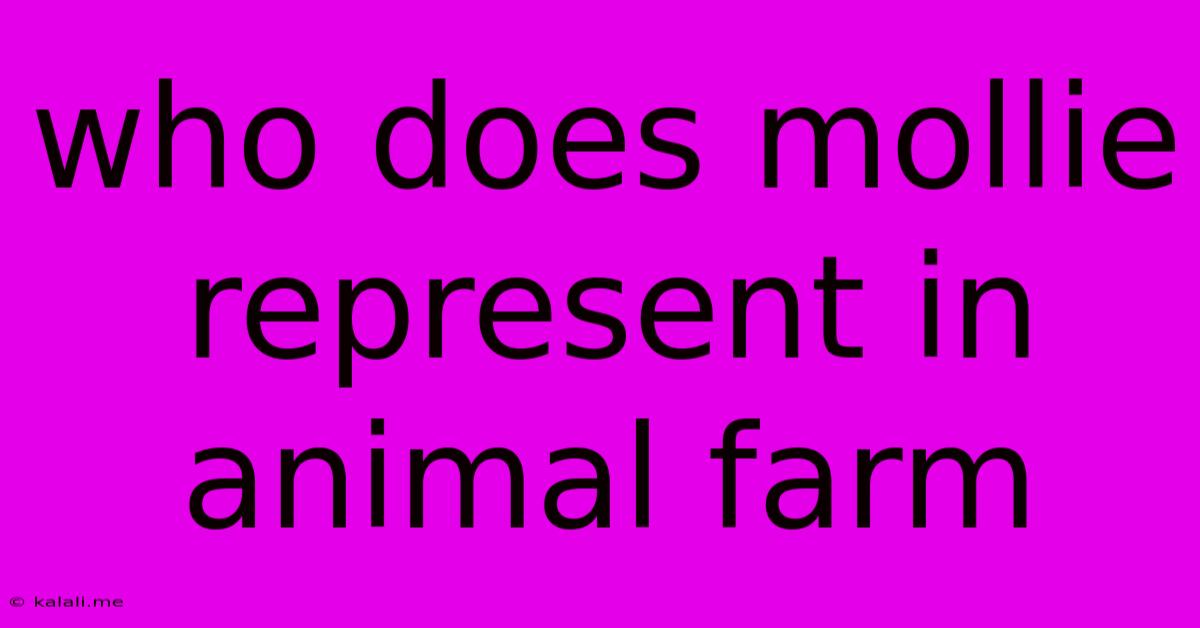Who Does Mollie Represent In Animal Farm
Kalali
May 26, 2025 · 3 min read

Table of Contents
Who Does Mollie Represent in Animal Farm? A Look at the Vain and Superficial
George Orwell's Animal Farm is a satirical allegory of the Russian Revolution, using animals to represent historical figures and societal classes. One character who often sparks debate is Mollie, the vain and pampered mare. While not as central to the plot as some other characters, her portrayal offers valuable insight into Orwell's critique of certain elements within society during and after the revolution. This article will explore who Mollie represents and the significance of her character within the broader context of the novel.
Mollie, the beautiful white mare, is primarily concerned with her own comfort and appearance. She loves sugar cubes, ribbons in her mane, and the attention of humans. She's indifferent to the ideals of Animalism and the farm's revolutionary goals, prioritizing personal vanity over collective effort. Her eventual defection to the neighboring farm highlights the dangers of prioritizing individual desires over the greater good.
Mollie as the Bourgeois Class
The most common interpretation of Mollie's character is that she represents the bourgeois class in pre-revolutionary Russia. This class, characterized by its wealth, comfort, and indifference to the struggles of the working class, epitomizes the privileged few who benefited from the existing social order. Mollie's love for luxury and her unwillingness to participate in the hard work of the revolution mirror the bourgeois class's reluctance to relinquish their privileged lifestyle. Her departure from Animal Farm symbolizes the flight of the wealthy and elite who feared the upheaval caused by the revolution.
Mollie and the Dangers of Individualism
Beyond representing a specific social class, Mollie also serves as a cautionary tale about the dangers of individualism. In the context of a revolution striving for collective equality, her focus on personal gratification and superficial pleasures undermines the shared goals of the animal community. Her actions highlight the potential for individual self-interest to fracture revolutionary movements. Orwell suggests that the success of a collective endeavor, such as the revolution, depends on the willingness of individuals to subordinate their personal desires to the common good. Mollie’s inability to do this ultimately leads to her downfall.
Mollie as a Symbol of Superficiality and Frivolity
Furthermore, Mollie can be interpreted as a symbol of superficiality and frivolity. Her obsession with appearances and her disregard for the more substantial aspects of life reflect a societal preoccupation with vanity and trivial pursuits. Orwell uses her character to satirize this tendency, suggesting that such superficiality can distract from more important matters and prevent meaningful engagement with social and political issues. This adds another layer to the criticism of pre-revolutionary society, highlighting its superficial values and distractions from the underlying social inequalities.
The Contrast to Other Characters
Mollie's character is particularly effective because she stands in stark contrast to other animals on the farm. Her vanity and lack of commitment directly oppose the dedication and hard work of animals like Boxer. This contrast emphasizes the divide between those who actively participate in the revolution and those who only benefit from it without contributing. The comparison serves to heighten the critique of those who prioritize self-interest over collective goals.
In conclusion, Mollie's role in Animal Farm is multifaceted. She functions as a symbol of the bourgeois class, a cautionary tale of individualism, and a representation of superficiality and frivolity. Her departure from Animal Farm underscores the importance of collective action and the dangers of prioritizing personal desires over the common good. Orwell skillfully uses her character to add layers of meaning to his satirical allegory, enriching the overall critique of revolution and its potential pitfalls.
Latest Posts
Latest Posts
-
How Long To Smoke 20 Lb Turkey
May 27, 2025
-
Washing Machine Making Noise When Agitating
May 27, 2025
-
How Long Is Tuna Good In The Refrigerator
May 27, 2025
-
How To Make A Matrix In Latex
May 27, 2025
-
How To Remove Chlorine From Tap Water
May 27, 2025
Related Post
Thank you for visiting our website which covers about Who Does Mollie Represent In Animal Farm . We hope the information provided has been useful to you. Feel free to contact us if you have any questions or need further assistance. See you next time and don't miss to bookmark.